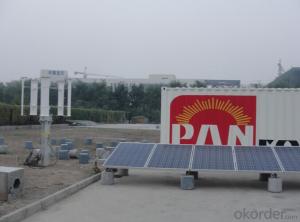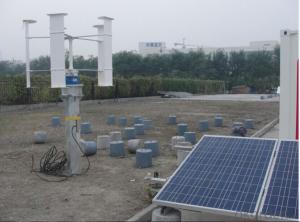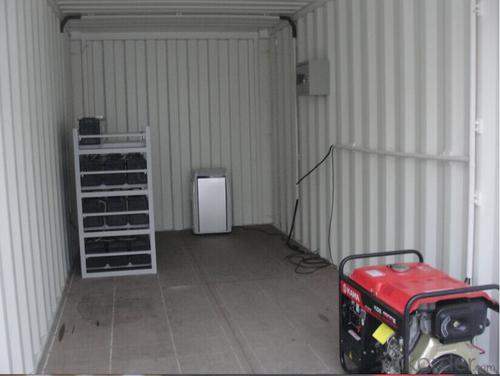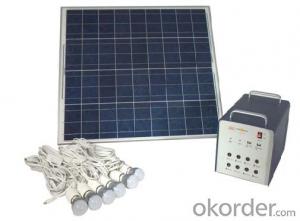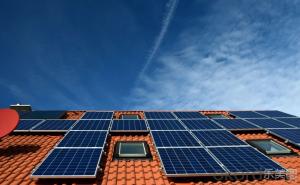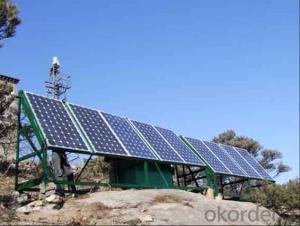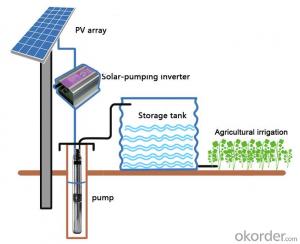Active Solar Energy Systems - Wind-PV(Diesel)Hybrid Power System 10kW
- Loading Port:
- Tianjin
- Payment Terms:
- TT OR LC
- Min Order Qty:
- 1 set
- Supply Capability:
- 30 set/month
OKorder Service Pledge
OKorder Financial Service
You Might Also Like
Specification List
Name | Specification | Quantity | |
1 | Containter | 20*8*8.6ft | 1 |
2 | Solar Module | 240W | 30 |
3 | Wind Generator | 500W | 2 |
4 | Battery | 12V120Ah | 20 |
5 | Controller | 120V/40A | 1 |
6 | Inverter | 6000W/AC230V | 1 |
7 | Diesel | 5000W/AC230V | 1 |
8 | Air Conditioner | 1000W | 1 |
9 | Cables | — | — |
10 | Others | — | — |
2.System Principle
3.System Advantage
Extend battery life |
Reduce the dependence of climate system |
24 hour uninterrupted power supply |
Low maintenance cost |
4.Product Specification
(A) Solar Module
Rated Power | 240W |
Vmppt | 29.4V |
Imppt | 8.17A |
Voc | 37.4V |
Isc | 8.55A |
Power Temp.Coeff(/℃) | -0.47% |
Ambient Temp | -40-85℃ |
Power Tolerance | ±3% |
NOCT | 46℃±2 |
(B) Battery
Rated Voltage | 240V | |
Rated Capacity (C10) | 120Ah | |
Weight | 35kg | |
Dimension | Lenth | 406mm |
Width | 174mm | |
Height | 209mm | |
Capacity | C120 | 150Ah |
C30 | 138Ah | |
C10 | 120Ah | |
C1 | 78Ah | |
Overcharging Protect Voltage | 14.4V/12V | |
Cut off Voltage | 10.8V/12V | |
(C) Wind Generator
Rated Power | 500W |
Rated Wind Speed | 13m/s |
Cut-in Speed | 4m/s |
Cut-out Speed | 25m/s |
Survival Wind Speed | 45m/s |
Mill Diameter | 1.36m |
Mill Height | 1.05m |
Mill Weight | 90kg |
Rated Voltage | AC 42V |
Rated Current | AC 6.9A |
Protection Level | IP54 |
(D) Controller
Solar Controller
Rated Power | 7.2KW |
MPPT | DC120V-350V |
Rated Voltage | DC 120V |
Rated Current | 60A |
Conversion Efficiency | ≥93% |
Overload Capacity | 120% output, 30mins |
Wind Generator Controller
Rated Power | 500W |
Maximum Power | 750W |
Rated Voltage | AC 42V |
E) Inverter
Rated Power | 6000W |
Rated Input Voltage | DC 120V |
Rated Input Current | DC 50A |
Rated Output Voltage | AC 230V |
Rated Frequency | 50Hz |
Rated Current | AC 26.1A |
Output Voltage Precision(V) | 230±5% |
Output Frequency Precision(Hz) | 50±0.05 |
Overload Capacity | 120%, 60S; 150%, 10S |
Inverter Efficiency | 80% |
- Q: Is it possible to store excess electricity generated by a solar energy system?
- Yes, it is possible to store excess electricity generated by a solar energy system. One common method of storage is through the use of batteries. Solar energy systems can be equipped with battery banks that store the excess electricity generated during the day for use during the night or when there is low sunlight. These batteries can be charged and discharged as needed, providing a reliable and continuous power supply even when the sun is not shining. Another method of storing excess electricity is through grid-tied systems. In this setup, when the solar energy system generates more electricity than is being used, the excess power is fed back into the electrical grid. This excess power is credited to the homeowner's account, and they can use these credits to draw electricity from the grid during times when their solar panels are not producing enough power, such as at night or during cloudy days. Both battery storage systems and grid-tied systems provide a way to store and utilize excess electricity generated by a solar energy system, ensuring that no energy goes to waste and enabling homeowners to have a reliable and uninterrupted power supply.
- Q: How do solar energy systems impact local wildlife?
- Solar energy systems can have both positive and negative impacts on local wildlife. On one hand, these systems do not produce air or water pollution, reducing habitat degradation and improving overall air quality. Additionally, solar panels can provide shade and shelter for certain species. However, the installation of solar farms can lead to habitat loss and fragmentation, affecting the natural movement and breeding patterns of some animals. It is essential to carefully plan and design solar energy systems to minimize these negative effects and protect local wildlife.
- Q: What are the benefits of using solar energy systems?
- There are several benefits of using solar energy systems. Firstly, they are a renewable source of energy, meaning that they can generate electricity without depleting natural resources. Secondly, solar energy systems produce clean energy, as they do not emit any greenhouse gases or pollutants during operation, contributing to a healthier environment. Additionally, solar energy systems can help reduce electricity bills, as they provide a cost-effective way of generating electricity for homes or businesses. Finally, installing solar panels can also increase the value of a property and create job opportunities in the renewable energy sector.
- Q: Can solar energy systems be used in areas with high levels of hail or other severe weather conditions?
- Yes, solar energy systems can be used in areas with high levels of hail or other severe weather conditions. However, it is important to select appropriate materials and design the system to withstand these conditions. For instance, using hail-resistant panels, positioning them at an angle, and employing protective measures can help mitigate the potential damage caused by hail or severe weather. Proper maintenance and insurance coverage are also advisable to ensure the longevity and efficiency of the solar energy system in such areas.
- Q: What is the role of solar energy systems in reducing water usage?
- Solar energy systems can play a significant role in reducing water usage by using sunlight to produce electricity instead of relying on traditional power plants that require large amounts of water for cooling purposes. This helps conserve water resources and mitigates the impact on aquatic ecosystems. Additionally, solar-powered irrigation systems can be used in agriculture, reducing the reliance on water-intensive irrigation methods, further contributing to water conservation efforts.
- Q: What is solar battery storage?
- Solar battery storage technology refers to the efficient method of storing energy generated by solar panels in batteries for future consumption. This system captures surplus electricity produced by solar panels throughout the day and stores it in batteries, instead of feeding it back into the grid. Subsequently, this stored energy can be utilized during periods when solar panels are unable to generate sufficient electricity, such as at night or on cloudy days. The advantages of solar battery storage are manifold. Firstly, it empowers homeowners and businesses to become more self-reliant and decrease their dependence on the conventional electrical grid. By storing excess energy, they can tap into it during times of peak demand or power outages, ensuring a steady and uninterrupted power supply. Moreover, solar battery storage optimizes the utilization of solar energy. Typically, solar panels produce more electricity than is immediately required, resulting in wastage or transmission back to the grid. By utilizing battery storage, this surplus energy can be stored and utilized later, thereby maximizing the utilization of solar power and diminishing the need for fossil fuel-based electricity. Furthermore, solar battery storage can contribute to reducing electricity bills. By utilizing stored energy during periods of high demand, when electricity rates are elevated, users can avoid paying higher prices for grid electricity. Consequently, this can lead to substantial cost savings over time. In summary, solar battery storage is an innovative technology that enhances the efficiency and dependability of solar energy systems. It enables users to store surplus energy for future use, reducing reliance on the grid, optimizing the utilization of solar power, and potentially reducing electricity expenses.
- Q: What are the advantages of solar energy systems?
- Solar energy systems offer several benefits. To begin with, solar energy is an endless source of power, relying on the sun's continuous existence. This stands in stark contrast to finite fossil fuels, which are depleting rapidly. Furthermore, solar energy is environmentally conscious. Unlike fossil fuels, solar energy systems do not release harmful greenhouse gases or pollutants that contribute to climate change and air pollution. This makes solar energy a clean and sustainable alternative that aids in reducing our carbon footprint and countering the adverse effects of global warming. Moreover, solar energy systems can significantly decrease electricity expenses. Once the initial investment in solar panels is made, the cost of harnessing solar energy remains relatively low. Solar energy is essentially free, with the only expenses being equipment maintenance and occasional repairs. This can result in substantial long-term savings on energy bills, especially considering the continuous rise in traditional electricity costs. Additionally, solar energy systems promote energy independence. By generating your own electricity, you become less reliant on utility companies and the fluctuating prices of fossil fuels. This independence enhances energy security, as solar energy systems are not susceptible to supply disruptions or price fluctuations caused by geopolitical tensions or natural disasters. Lastly, the installation of solar energy systems stimulates local economies and job creation. The solar industry has experienced significant growth, leading to the creation of numerous jobs in manufacturing, installation, and maintenance. This not only boosts the economy but also provides employment opportunities in a rapidly expanding sector. In conclusion, the benefits of solar energy systems are manifold. From being a renewable and environmentally friendly power source to reducing electricity expenses, providing energy independence, and generating jobs, solar energy proves to be a viable and sustainable solution for our energy needs.
- Q: Can solar energy systems be used in areas with limited access to housing?
- Yes, solar energy systems can be used in areas with limited access to housing. Solar panels can be installed on rooftops, open land, or even on portable structures like solar-powered tents or trailers. These systems can provide electricity and power to meet the energy needs of people living in remote or off-grid areas, where traditional power infrastructure may be limited or nonexistent. Additionally, advancements in solar technology, such as compact and lightweight panels, have made it easier to deploy solar systems in areas with limited housing options.
- Q: Can solar energy systems be integrated into building materials, such as solar roof tiles?
- Solar energy systems can indeed be incorporated into building materials, and one popular instance of this is the utilization of solar roof tiles. These tiles, also referred to as solar shingles or solar slates, have been meticulously designed to resemble conventional roofing materials while simultaneously harnessing solar energy. Constructed with photovoltaic cells that convert sunlight into electricity, these specialized tiles have numerous advantages over traditional solar panels. One of the primary benefits of solar roof tiles is their seamless integration with a building's overall aesthetics, resulting in a more visually appealing structure. This harmonious blend into the building's structure allows for a more cohesive design, particularly in regions where stringent architectural guidelines are in effect. Moreover, solar roof tiles can be installed on both new and existing buildings, providing a flexible and adaptable solution. Another advantage of solar roof tiles lies in their ability to generate electricity while exhibiting durability and resistance to harsh weather conditions. These tiles are specifically designed to withstand various elements, including rain, snow, and wind. Additionally, solar roof tiles are typically manufactured using high-quality materials, ensuring a longer lifespan compared to traditional roofing materials. The integration of solar energy systems into building materials, exemplified by solar roof tiles, offers a multitude of benefits. Not only do they generate clean and renewable energy, but they also contribute to reducing reliance on fossil fuels and decreasing carbon emissions. Additionally, solar roof tiles can assist in reducing energy costs by generating electricity on-site, enabling homeowners and businesses to achieve greater energy independence. In summary, solar energy systems can indeed be incorporated into building materials, and solar roof tiles serve as a prime example of this. With their visually appealing appearance, durability, and capacity to generate energy, solar roof tiles present a promising solution for harnessing solar power while simultaneously preserving the architectural integrity of a building.
- Q: What are the maintenance requirements for solar energy systems?
- Solar energy systems require minimal maintenance. The main maintenance requirements include regularly cleaning the solar panels to remove dust and debris, checking the connections and wiring for any signs of damage or wear, and monitoring the system's performance to ensure it is generating the expected amount of electricity. Additionally, the inverter, which converts the solar energy into usable electricity, may need to be replaced after around 10-15 years. Overall, with proper maintenance, solar energy systems can last for several decades with little to no issues.
Send your message to us
Active Solar Energy Systems - Wind-PV(Diesel)Hybrid Power System 10kW
- Loading Port:
- Tianjin
- Payment Terms:
- TT OR LC
- Min Order Qty:
- 1 set
- Supply Capability:
- 30 set/month
OKorder Service Pledge
OKorder Financial Service
Similar products
Hot products
Hot Searches
Related keywords

